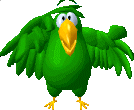


This framework can be further applied to conceptualize and situate future studies. As research on pedagogical agents is highly complex, we propose a multi-level framework to enable systematic comparisons between different studies and the identification of gaps in the literature. He promised to help you use the internet, but mostly he just got in the way.

He could talk, tell jokes, sing, and generally annoy you. We map out this research in order to answer three main questions: Do pedagogical agents facilitate learner motivation and learning? Under what conditions are they effective? How should they be designed? The review reveals that various studies have not investigated the first two fundamental questions due to a lack of control groups. If you had a computer in the early 2000s and didn’t have a ton of common sense (or proper antivirus software), you probably ended up with an allegedly helpful purple ape named BonziBuddy crowding your desktop. More than 70 articles on pedagogical agents have been published since, and 26 of them examine motivational and learning effects. A review was published by Clarebout, Elen, Johnson and Shaw in 2002 where a lot of promises were made, but research on the motivational and learning effects of pedagogical agents was scarce. Pedagogical agents, characters that guide through multimedia learning environments, recently gained increasing interest.


 0 kommentar(er)
0 kommentar(er)
